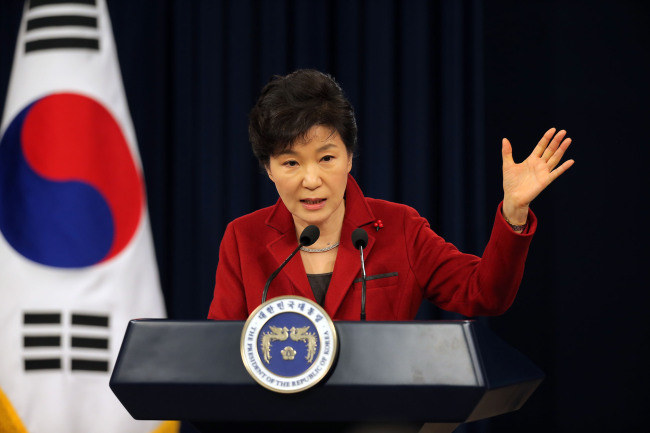 The government said Tuesday it will seek to revamp the local economy by boosting investment and domestic consumption and help improve the livelihoods of ordinary citizens.
The government said Tuesday it will seek to revamp the local economy by boosting investment and domestic consumption and help improve the livelihoods of ordinary citizens.
In a joint report to President Park Geun-hye in Sejong on the government’s economic policy goals for this year, six economy-related ministries led by the Ministry of Strategy and Finance emphasized a “healthy” economy supported by domestic demand and exports.
“The government’s economic policy for 2015 focuses on organic connection and cooperation among different ministries to help realize the government’s three-year economic reform plan that seeks to increase the country’s potential growth and employment rates to 4 percent and 70 percent, respectively, while also boosting its per capita income to over $40,000,” Vice Finance Minister Joo Hyung-hwan said in a pre-briefing Monday.
The report was joined by the Ministry of Employment and Labor, the Ministry of Land, Infrastructure and Transport, the Ministry of Agriculture, Food and Rural Affairs, the Ministry of Oceans and Fisheries and the Fair Trade Commission.
Efforts to boost domestic consumption will include opening four new duty-free shops throughout the country, along with new hotels with a combined total of 5,000 rooms, both also aimed at meeting the growing demand from foreign tourists.
In 2014, the number of foreign tourists to South Korea reached a record high of more than 14 million, with the number of tourists from China alone spiking 40.9 percent on-year to 5.71 million.
The government said it will encourage spending by boosting income through new jobs and the easing of debt burdens.
As of end-November, the country’s household debts amounted to 554.3 trillion won ($511.87 billion), with the total amount of home-backed loans surging 10.8 percent on-year to 299.7 trillion won in 2014.
The government said it will come up with a way to help convert about 40 trillion won worth of home-backed loans into long-term, fixed-rate loans.
To spur local spending and promote investment at the same time, the government will spend 3 trillion won ($2.77 billion) to build six new industrial complexes.
It will also aim to more than double technology-based investment and loans to more than 20 trillion won from 8.9 trillion won in 2014.
While boosting domestic consumption, the government will continue to trim what it deems excessive or unnecessary spending by public firms and government offices.
Such efforts helped cut the combined debts of 18 state-run corporations by 24.4 trillion won in 2014 alone, the finance ministry said.
It seeks to further reduce debts and spending by integrating and terminating some 600 overlapping projects or businesses before 2017. Operations that encroach on the private sector will be trimmed, with the 2015 budget already reflecting measures that will streamline some 300 operations.
The government said that the 2016 budget will reflect the remaining streamlining efforts, which is one year ahead of the original plan.
“A comprehensive guideline to deal with redundancies, inefficiency and to get public companies to concentrate on their core operations will be announced in April,” Bang Moon-kyu, the second vice finance minister, told reporters. He said changes include introducing a merit-based pay system for most employees working for public companies.
Officials said the merit pay system could apply to people who have been on the payroll of a company for more than seven years. At present, only top executives get paid based on performance appraisals.
Bang stressed that the focus of streamlining operations is not only to deal with unnecessary spending, but to offer better service to the people. The official said corporations that handle social overhead capital, culture and arts, farm and fisheries will be marked for change this year.
He said that putting a cap on corporate bonds issuance will be discussed in detail in the coming months, an indication that more companies may be told to limit the issuance of debts. At present, 16 companies come under this restriction.
Bang said that public companies will continue to set the example in new hirings by officially employing part-time workers who have performed satisfactorily for more than two years.
There will also be concrete steps to revitalize the country’s real estate market, partly by promoting private home rental businesses.
The government said it will eliminate all but two of six key regulations on home rental businesses, while offering tax incentives to those newly entering the market. Tax incentives proposed include 50 percent cuts in acquisition taxes for homes that will be used in rental businesses, up from 25 percent at present, and up to 100 percent exemption from corporate taxes for firms that let out homes to people for more than eight years at a time. Such measures could effectively allow profit margins to reach 5 percent, seen as the minimum requirement to entice new entrants to the business.
At present, most lease and rent contracts for homes last two years, after which the home owner can opt to raise rent.
The government also said it will offer favorable interest rates to companies that enter the home rental market to increase supply and help stabilize market prices. Policymakers said the goal is to attract more medium-size builders.
On ways to bolster the job market, the labor ministry said it will introduce a new law in the first half that will promote hiring of people in the domestic service sector.
On fair trade and corporate oversight, the FTC said it will step up monitoring of unfair business activities, take steps to rectify unfair treatment of small and medium enterprises, and streamline reporting processes of illegal activities while protecting whistleblowers.
“In particular, extra effort will be made to take firm action against delayed payment to vendors by large companies and illegal activities in the franchise sector,” the antitrust watchdog said. It said TV home shopping firms cited for holding up payment to suppliers will be watched carefully. (Yonhap)

